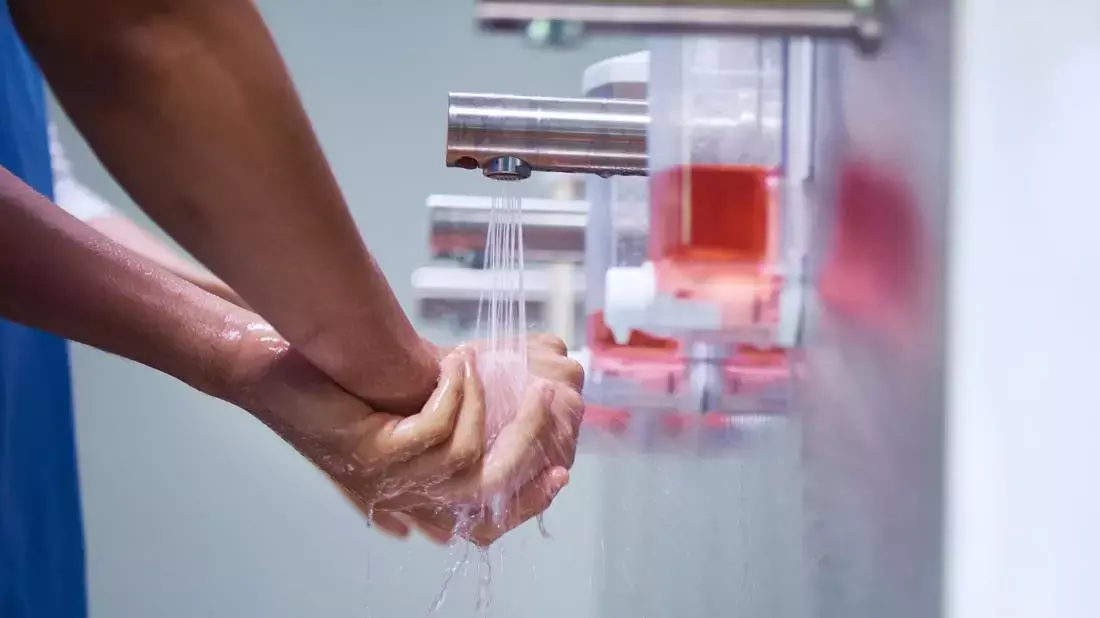- Home
- Medical news & Guidelines
- Anesthesiology
- Cardiology and CTVS
- Critical Care
- Dentistry
- Dermatology
- Diabetes and Endocrinology
- ENT
- Gastroenterology
- Medicine
- Nephrology
- Neurology
- Obstretics-Gynaecology
- Oncology
- Ophthalmology
- Orthopaedics
- Pediatrics-Neonatology
- Psychiatry
- Pulmonology
- Radiology
- Surgery
- Urology
- Laboratory Medicine
- Diet
- Nursing
- Paramedical
- Physiotherapy
- Health news
- Fact Check
- Bone Health Fact Check
- Brain Health Fact Check
- Cancer Related Fact Check
- Child Care Fact Check
- Dental and oral health fact check
- Diabetes and metabolic health fact check
- Diet and Nutrition Fact Check
- Eye and ENT Care Fact Check
- Fitness fact check
- Gut health fact check
- Heart health fact check
- Kidney health fact check
- Medical education fact check
- Men's health fact check
- Respiratory fact check
- Skin and hair care fact check
- Vaccine and Immunization fact check
- Women's health fact check
- AYUSH
- State News
- Andaman and Nicobar Islands
- Andhra Pradesh
- Arunachal Pradesh
- Assam
- Bihar
- Chandigarh
- Chattisgarh
- Dadra and Nagar Haveli
- Daman and Diu
- Delhi
- Goa
- Gujarat
- Haryana
- Himachal Pradesh
- Jammu & Kashmir
- Jharkhand
- Karnataka
- Kerala
- Ladakh
- Lakshadweep
- Madhya Pradesh
- Maharashtra
- Manipur
- Meghalaya
- Mizoram
- Nagaland
- Odisha
- Puducherry
- Punjab
- Rajasthan
- Sikkim
- Tamil Nadu
- Telangana
- Tripura
- Uttar Pradesh
- Uttrakhand
- West Bengal
- Medical Education
- Industry
EICM promising intervention to combat MRSA infection among orthopaedics surgery patients

T. Latha et al conducted a study to find the effectiveness of Extended Infection Control Measures (EICM) in reducing the rate of methicillin-resistant Staphylococcus aureus (MRSA) infection among orthopaedic surgery patients.
They found that - EICM is a promising intervention to combat MRSA infection among orthopaedic wards. Hence, it can be executed in orthopaedic wards, thereby improving the treatment quality and reducing the infection-related consequences.
The study adopted a quasi-experimental design and was conducted in the orthopaedic units of a tertiary care hospital. This study recruited 168 orthopaedic patients and 154 healthcare professionals (HCPs). EICM included hand hygiene, decolonizing the patients and HCPS, staff education, feedback of surveillance data, treatment of high-risk and MRSA-infected patients, having separate equipment for MRSA-infected patients, and appropriate cleaning of patient's unit.
The components of EICM* are –
Patient-specific components
1. Screening of the patient and decolonization of colonizers
2. Treatment of high-risk patients
3. Treatment of known MRSA patient
Healthcare professional-specific components
4. Empowering healthcare professionals
5. Hand hygiene
6. Screening & treatment of healthcare professionals
7. Feedback of surveillance data
Environment specific components
8. Separate equipment for the patient with MRSA infection
9. Floor cleaning regimen
10. Terminal cleaning of unit
(*read the reference article for further details)
The observations of the study were:
• There were 134 (79.8%) males, 59 (35.1%) patients were in the age group of 18–30 years, 113 (67.3%) were from rural residences, and 69 (41.1%) were admitted with a history of traumatic injury &121 (72%) patients underwent elective surgery.
• Of 168 patients, 21 (12.5%) had anterior nasal colonization with MRSA. The colonized patients were treated effectively as per the protocol.
• The duration of the hospital stay ranged from 2 days to 31 days with a median of 6.5 (interquartile range 4–10) days.
• The EICM effectively reduced MRSA infection from 21.2 to 6% (p<0.001).
• The structured knowledge questionnaire on MRSA infection and its prevention was administered on day 1 (pre-test) before implementing the EICM. Small group discussions, one-to-one discussions, booklets on MRSA infection and prevention and later, clarifying their doubts were used as tools for awareness. A post-test was conducted after 3 months of teaching. The mean score in the pre-test was 17.5±3.3, whereas the post-test was 23.2±3.
• A paired t test was computed to test the hypothesis on finding the effectiveness of EICM in the knowledge of healthcare professionals (HCPs) on MRSA infection and its prevention.
"A randomized control trial was not feasible as the HCPs included in the intervention and control arm would interact and share the information. The study was conducted in a single hospital, since no similar hospital was accessible to make the research study true experimental. More studies are required to generalize the findings with improved methodology and cost analysis" the authors commented.
Further reading:
Efectiveness of Extended Infection Control Measures on Methicillin Resistant Staphylococcus aureus Infection Among Orthopaedic Patients T. Latha, Anil K. Bhat et al Indian Journal of Orthopaedics (2022) 56:1804–1812 https://doi.org/10.1007/s43465-022-00713-5
MBBS, Dip. Ortho, DNB ortho, MNAMS
Dr Supreeth D R (MBBS, Dip. Ortho, DNB ortho, MNAMS) is a practicing orthopedician with interest in medical research and publishing articles. He completed MBBS from mysore medical college, dip ortho from Trivandrum medical college and sec. DNB from Manipal Hospital, Bengaluru. He has expirence of 7years in the field of orthopedics. He has presented scientific papers & posters in various state, national and international conferences. His interest in writing articles lead the way to join medical dialogues. He can be contacted at editorial@medicaldialogues.in.
Dr Kamal Kant Kohli-MBBS, DTCD- a chest specialist with more than 30 years of practice and a flair for writing clinical articles, Dr Kamal Kant Kohli joined Medical Dialogues as a Chief Editor of Medical News. Besides writing articles, as an editor, he proofreads and verifies all the medical content published on Medical Dialogues including those coming from journals, studies,medical conferences,guidelines etc. Email: drkohli@medicaldialogues.in. Contact no. 011-43720751


